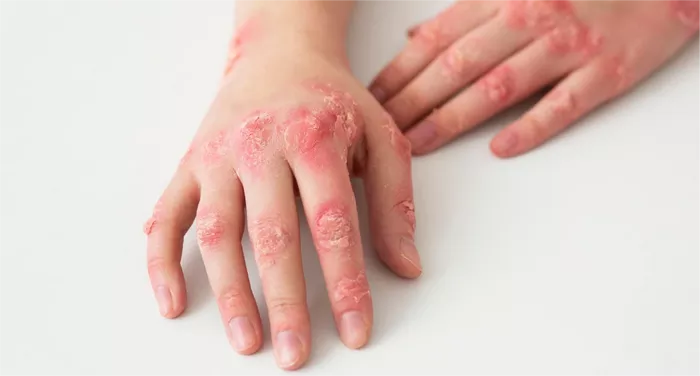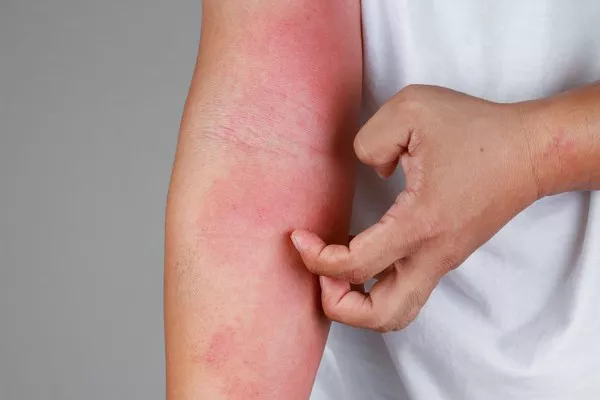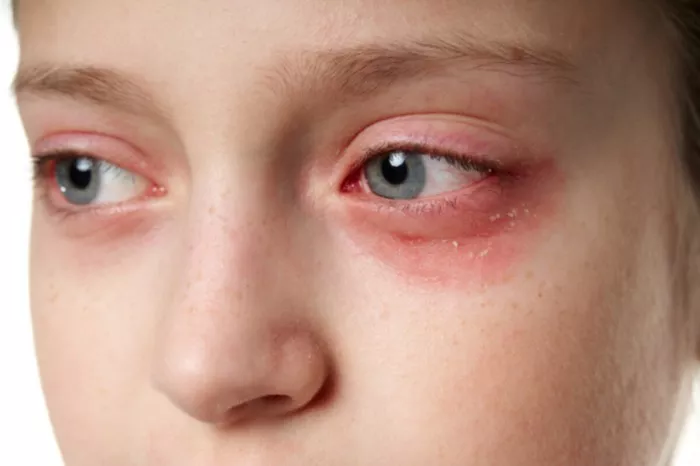Hyperpigmentation is a common skin condition where patches of skin become darker than the surrounding areas. It often occurs after skin injuries, such as eczema flare-ups. Eczema is a condition that causes inflammation, redness, and itching, and when scratched, it can lead to dark spots or scars. These dark spots, often referred to as post-inflammatory hyperpigmentation (PIH), can be frustrating and challenging to treat. But with the right approach, you can reduce the appearance of these spots and promote healthier, more even skin.
In this article, we’ll explore what hyperpigmentation from eczema is, the causes behind it, and most importantly, how to treat it effectively.
What Is Hyperpigmentation from Eczema?
Hyperpigmentation is the darkening of the skin due to increased melanin production. Melanin is the pigment responsible for the color of your skin, hair, and eyes. When eczema causes inflammation or injury to the skin, it can trigger the skin to produce excess melanin, leading to dark spots.
Hyperpigmentation from eczema can occur after flare-ups or when eczema patches heal. The skin may darken as a response to the inflammation. This process is called post-inflammatory hyperpigmentation (PIH) because it occurs after an inflammatory event. PIH can last from several months to even years, but with the right care, you can speed up the process and reduce the discoloration.
Why Does Hyperpigmentation Happen After Eczema?
When eczema flares up, the skin becomes irritated and inflamed. Scratching or rubbing the affected area further irritates the skin, which can lead to a thicker, darker patch as the skin heals. The increased production of melanin is the body’s way of protecting the skin from the UV rays and further damage.
The deeper the inflammation and the longer the eczema lasts, the more likely hyperpigmentation will occur. People with darker skin tones are also more prone to PIH because their skin naturally produces more melanin.
Factors that Increase the Risk of Hyperpigmentation from Eczema
Several factors can make hyperpigmentation more likely to happen with eczema:
Scratching: Constant scratching or rubbing of eczema patches can cause skin trauma, leading to more noticeable dark spots.
Skin color: Darker skin tones tend to produce more melanin, making post-inflammatory hyperpigmentation more prominent.
Severe eczema: The more severe the eczema flare-up, the more likely it is to cause hyperpigmentation.
Inadequate treatment: If eczema is not properly treated, it may lead to persistent inflammation, increasing the risk of dark spots.
How to Prevent Hyperpigmentation from Eczema
While you cannot always avoid eczema flare-ups, there are things you can do to prevent or minimize hyperpigmentation:
1. Avoid Scratching
Scratching eczema can lead to further irritation and injury to the skin, increasing the risk of hyperpigmentation. Although scratching is often irresistible due to itching, it is one of the most important steps in preventing PIH.
Tips to Avoid Scratching:
Use a cold compress: Applying a cold compress to itchy areas can help soothe the skin and reduce the urge to scratch.
Moisturize: Dry skin exacerbates eczema and itching. Regular moisturizing can reduce dryness and make the skin feel more comfortable.
Topical corticosteroids: If prescribed, these can help reduce inflammation and itching, preventing scratching.
2. Treat Eczema Effectively
Proper treatment of eczema can reduce flare-ups and inflammation, preventing further damage to the skin. Always follow your doctor’s recommendations for managing eczema.
Topical treatments: Use prescribed corticosteroid creams or ointments to manage flare-ups and reduce inflammation.
Avoid triggers: Identify and avoid eczema triggers, such as allergens, harsh soaps, and extreme temperatures.
Gentle skin care: Use fragrance-free, gentle moisturizers and cleansers to avoid irritation.
3. Protect the Skin from the Sun
Exposure to the sun can darken the spots of hyperpigmentation. This is especially true for PIH, as the skin is already sensitized from inflammation. Always wear sunscreen with SPF 30 or higher to protect healing skin.
Apply sunscreen: Use broad-spectrum sunscreen daily, even on cloudy days.
Wear protective clothing: In addition to sunscreen, wear hats and clothing to shield the skin from UV rays.
How to Treat Hyperpigmentation from Eczema
Now that we’ve covered prevention, let’s explore treatment options. While hyperpigmentation may take time to fade, there are steps you can take to speed up the healing process.
1. Topical Treatments for Hyperpigmentation
There are several ingredients known for their ability to reduce hyperpigmentation. You can apply these treatments directly to the affected areas of skin.
Hydroquinone: Hydroquinone is a bleaching agent that inhibits melanin production, helping to lighten dark spots. It is often prescribed for PIH and other skin discoloration issues.
How to use: Apply a 2-4% hydroquinone cream to the affected areas twice daily. You may need a prescription for stronger formulations.
Vitamin C: Vitamin C is an antioxidant that helps lighten skin by inhibiting melanin production and promoting collagen synthesis. It can also reduce skin inflammation and speed up skin healing.
How to use: Look for serums or creams that contain stabilized vitamin C (ascorbic acid or its derivatives). Apply them in the morning after cleansing and before sunscreen.
Niacinamide: Niacinamide (Vitamin B3) is an effective ingredient for reducing hyperpigmentation. It works by inhibiting melanin transfer to the skin’s surface and can help even out skin tone.
How to use: Apply a niacinamide serum or cream to the affected areas twice daily. It is a gentle treatment, suitable for sensitive skin.
Retinoids: Retinoids, such as tretinoin, help speed up cell turnover, allowing new skin to grow and fade dark spots more quickly. Retinoids are also effective for reducing inflammation and promoting healing.
How to use: Retinoid creams are typically used at night. Start with a lower concentration (e.g., 0.025%) and gradually increase it. Retinoids can make the skin more sensitive, so always apply sunscreen during the day.
Alpha Hydroxy Acids (AHAs): AHAs, like glycolic acid and lactic acid, gently exfoliate the skin, removing dead skin cells and allowing fresh skin to surface. They also help improve skin texture and lighten dark spots over time.
How to use: Apply an AHA-based toner or serum to the affected area once or twice a week. Be sure to follow with sunscreen.
2. Laser Treatments
For stubborn cases of hyperpigmentation, laser treatments may be an option. Lasers like fractional laser, pulsed dye laser, or intense pulsed light (IPL) can target melanin in the skin and help break down dark spots.
Consult a dermatologist: If you’re considering laser treatment, it’s best to consult a dermatologist. They can determine which laser is best for your skin type and condition.
3. Chemical Peels
Chemical peels use exfoliating acids to remove the top layer of skin, encouraging the growth of new, evenly pigmented skin. This can be particularly helpful for treating post-inflammatory hyperpigmentation.
Consult a dermatologist: Chemical peels should be performed by a professional, as they can cause irritation if not done correctly.
4. Natural Remedies
Some people prefer to try natural remedies to lighten dark spots. While these options may not be as potent as prescription treatments, they can still provide some benefits with consistent use.
Aloe vera: Aloe vera has soothing and skin-healing properties. Apply fresh aloe vera gel to the affected area daily to help calm inflammation and reduce pigmentation.
Turmeric: Turmeric contains curcumin, which has anti-inflammatory properties and may help reduce pigmentation. You can apply a turmeric paste to the dark spots, but be cautious, as turmeric can stain the skin.
Green tea: Green tea extract may help reduce pigmentation due to its antioxidant and anti-inflammatory properties. You can apply cooled green tea bags to the skin or use products containing green tea extract.
5. Patience and Consistency
Hyperpigmentation from eczema takes time to fade, and the best way to treat it is with patience and consistent care. Most treatments will take weeks to show results, and in some cases, it may take months. Consistently using the right products, avoiding triggers, and protecting your skin from the sun will help the healing process.
When to See a Dermatologist
If your hyperpigmentation from eczema doesn’t improve with over-the-counter treatments, or if it worsens, it may be time to consult a dermatologist. They can help create a personalized treatment plan and may recommend stronger medications or professional treatments like laser therapy or chemical peels.
Conclusion
Hyperpigmentation from eczema is a common issue that can be frustrating to deal with. While it may take time for dark spots to fade, the good news is that there are many effective treatment options available. By avoiding scratching, treating eczema promptly, and using the right topical treatments, you can significantly reduce the appearance of hyperpigmentation. Remember to protect your skin from the sun and be patient—healthy, even-toned skin is possible with the right care.
Related topics:


























